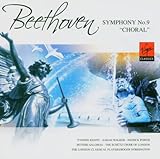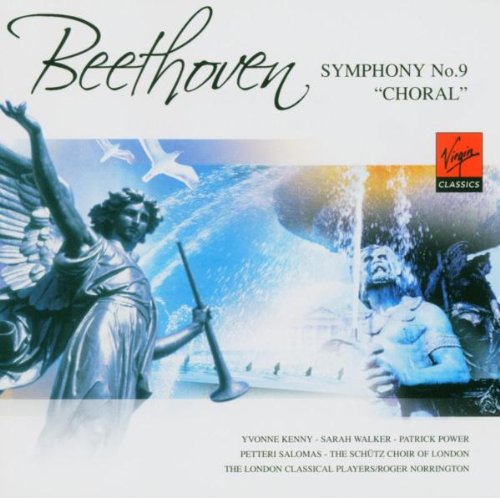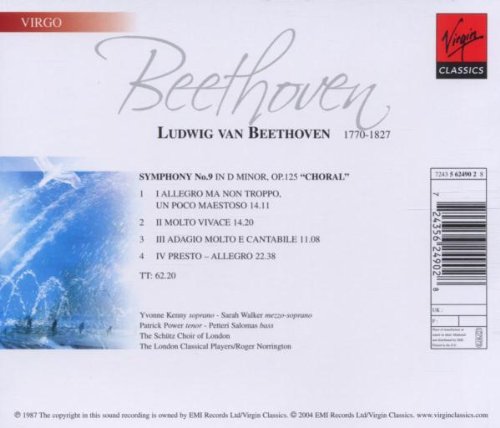Disco de Ludwig van Beethoven: «Sym 9»

- Valoración de usuarios: (3.9 de 5)
- Título:Sym 9
- Fecha de publicación:2005-03-29
- Tipo:Audio CD
- Sello discográfico:EMI Classics
- UPC:724356249028
- 1I. Allegro Ma Non Troppo, Un Poco Maestoso
- 2II. Molto vivace
- 3III. Adagio Molto E Cantabile
- 4IV. Presto - Allegro
With this magnificently fresh but powerful Ninth Symphony by Ludwig van Beethoven (and maybe with this whole cycle in general, but I don't know, because up till now I have heard only this recording), maestro Bernard Haitink has delivered what could maybe be called the 'ultimate' in this work, to stand aside any of the best.
This recording surely is a culmination and a crowning achievement of, firstly, a more than 50 year conducting career; secondly, a vision of a conductor who has been 'working with Beethoven' for more than 30 years (when Bernard Haitink recorded his first Beethoven cycle); and thirdly, the growing insights of period instrument practice slowly melting with 'traditional' performing tradition, cumulating into what could only be called 'the best of both worlds'. But the 'live' element must probably be taken into account here as well, as it is known that, generally, a 'live' Bernard Haitink is a 'better' one, coaxing the maestro to give his utmost. The man Bernard Haitink, it is known, really lives with and for his music, truly coming alive before the orchestra with attentive present audience to witness the man and the maestro at recreating the fruit of genius that is the music of Ludwig van Beethoven (Gustav Mahler, Anton Bruckner, ...).
The orchestral playing is - as is so often the case with Bernard Haitink - absolutely clear, honest, with noble sentiment, but without any excess, which is good. There is no unnecessary lingering or dawdling at any time in this recording, always going purposely forward toward our goal. Above this, like a Dutch commentator said, we have 'warm strings, layering of different orchestral voices and transparent woodwinds and brass.' Combine this with the above said achievements of a long and impressive conducting career and the growing insights and mergings of performance practices, and you get maybe the best Beethoven imaginable.
This Beethoven 9 sounds fresh and athletic, completely alive and brimming with youthful energy (Haitink is 77!): the 'muscle tone' directly 'visible' underneath the tight and smooth 'skin' of the wonderfully attentive and fresh playing of the London Symphony Orchestra, as it were. To my ears, it is almost incredible what unimagined orchestral colors, inflections and nuances maestro Haitink coaxes (if I may call it that ;-) out of the (obviously very willing) orchestra sometimes, things one has never before heard in this music in this way (a result of maestro Haitink's careful abovementioned layering of orchestral voices?), but always absolutely gorgeous. Listen, for example, to the magnificent third movement Adagio, which is taken at naturally flowing speeds, not as slow as von Karajan (1984) [15:54] or as fast as Philippe Herreweghe (1998) [12:26].
This Beethoven is so freshly inspired, 'healthy' and with so much spring in its step, that it will probably (hopefully?) last as a benchmark for a whole generation of listeners and performers. For fans of the LSO and devotees of Bernard Haitink, I think this is unmissable. I for one love this recording and as a result I wholeheartedly recommend it to anyone without any reserve.
Distinguished Dutch conductor Bernard Haitink's latest, truly relevatory, traversal of the Beethoven symphonies ends with this triumphant, enthralling interpretation of the 9th "Choral" Symphony in D minor. His magnificient interpretation is unquestionably one of the finest accounts of this symphony ever recorded, and definitely the best I have heard since Claudio Abbado's two distinguished recordings on Sony and Deutsche Grammophon with the Berliner Philharmoniker, using the same Jonathan Del Mar-edited Barenreiter Edition. Although strongly influenced by period instrument practice, Haitink strikes a fine balance between that and more traditional accounts of this symphony, without ignoring the swift tempi required of it from the relatively new Barenreiter Edition, and yet, yielding an awe inspiring, truly magisteral performance (Personally, I've fallen in love with Haitink's interpretation, finding it somewhat more engrossing than either of Abbado's.). Indeed, this latest recording of the Beethoven 9th Symphony may be the most dramatic, most exciting account that I've heard, and one that's worthy of all the critical and popular acclaim it has earned so far. Moreover, the sound quality is exemplary thanks to the superb job in recording this performance live during two concerts in late April 2006 by producer James Mallinson and his team of engineers on behalf of the LSO Live label.
Haitink's interpretation is a no-nonsense, technically brilliant, yet still most mesmerizing, account of this symphony. He opens with a vividly intense first movement (Allegro ma non troppo, un poco maestoso) dominated by exquisite playing from the winds and strings. His treatment of the second movement (Scherzo; molto vivace) is neither as ponderous as any I've heard from the likes of Giulini and Karajan, nor is it as swift as Zinman's or Abbado's, but instead, sounds just right, showcasing once more the exemplary playing from the London Symphony Orchestra's winds and strings. Haitink's interpretation of the third (Adagio molto e cantible) and fourth (Presto - Allego ma non troppo - Vivace - Adagio cantible) movements are the most electrifying accounts I have heard, replete with excellent performances too from both the soloists and the London Symphony Orchestra Chorus in the memorable "Ode to Joy" which encompasses virtually the entire fourth movement (I haven't heard of the soloists before, but their singing is comparable to the finest I have heard in Abbado's and Karajan's recordings.).
This 1941 performance of the Beethoven Ninth Symphony, with Karl Böhm conducting the Dresden Staatskapelle with soloists Margarete Teschemacher, Elisabeth Höngen, Torsten Ralf, and Josef Herrmann has been released before on an obscure label and I've not heard that one. This release has been reportedly remastered and the sound from this broadcast sounds pretty good for its time although no one wanting a modern-sound recording will be tempted.
Those who would be tempted to buy it would be fans of Böhm's way with Beethoven, a known and valued commodity, as well as admirers of the four singers involved. All of them were soloists at the Dresden State Opera at the old Semper Opera House before it was destroyed by Allied bombs. The singers are at the height of their careers, all of them in their late thirties and early forties and in good vocal estate. The performance itself is fairly mainline although there are some slow tempi in some of the transitions in the second and fourth movements and of course these are not streamlined HIP performances. Think early Klemperer or Karajan and you'll have some idea. The soloists are outstanding, as is the chorus. There is some minor pitch instability occasionally but not enough to interfere with this recording of what must have been an exciting event.
This is definitely for the historical recordings aficionados and you know who you are.
Scott Morrison
Karl Bohm leads the Staatskapelle Dresden in this historic performance of Beethoven's 9th Symphony. Featured vocalists include Magarethe Teschemacher, Torsten Ralf, Josef Herrmann, and Elizabeth Hongen. This release is part of Hanssler Profil's Edition Staatskapelle Dresden, replete with the usual superb documentation and articles. An excellent historical window on great music-making.
I was doing perfectly fine with this recording right up until the chorus entered in the 4th movement. The distortion was intolerable. In fact, it is without question one of the very worst recordings from the standpoint of distortion of any recording that I have heard from this era. It is difficult to imagine how this could have happened, given the importance of the choral in this symphony and its historical significance, but there are evidently a lot of recording engineers with very poor hearing and who evidently lack the ability to recognize distortion when they hear it.
As far as concerns the debate over the "historically informed performance" aspect, I do not find anything remotely objectionable about this, and I do not understand people who have a problem with this approach to Beethoven and other older works. The critics who argue that Beethoven's metronome markings were in error and so forth clearly do not have any factual basis for such claims. In fact, there is evidently an historical trail documenting the significant changes that have occurred, over the nearly two centuries since Beethoven wrote this symphony, to the way it is customarily performed. Perhaps the critics believe that since Beethoven never got to hear it, he would have to right to decide how it should be played. If he were alive today, he would probably go around and beat them all up.
But as I said, this recording is fatally flawed due to the very poor technical quality of the recording, which, according to the copyright date on the back of the CD case, took place in 1987. Had I not encountered this problem, I would probably be inclined to listen to this recording many times in the future. Now I will have to decide whether I want to listen to the first three movements only and then stop without listening to the 4th movement. This doesn't sound very appealing to me, so I probably will not listen to this recording again. But I am still interested in the concept of the historically informed performance, so it looks like my next purchase will also be the "Glorious Ninth", only this time the Gardiner/Monteverdi performance. Hopefully, the recording engineers will have done a better job with it.


